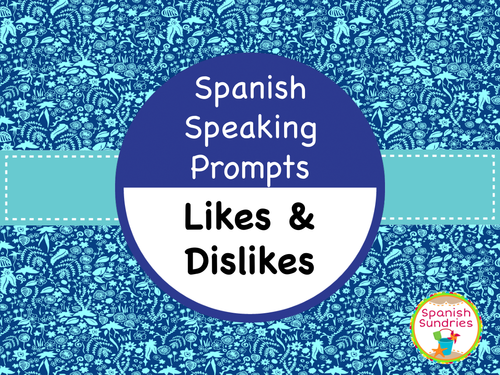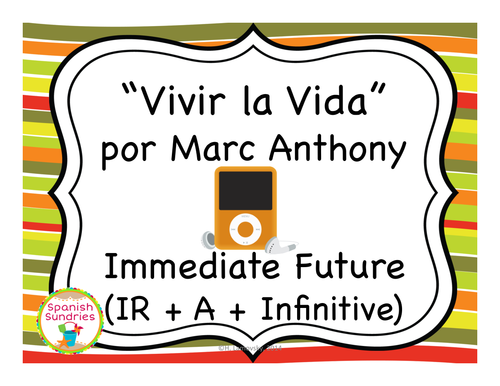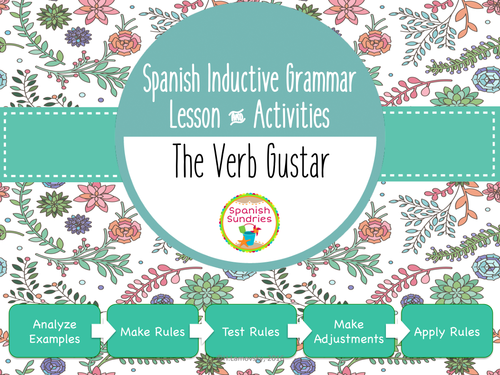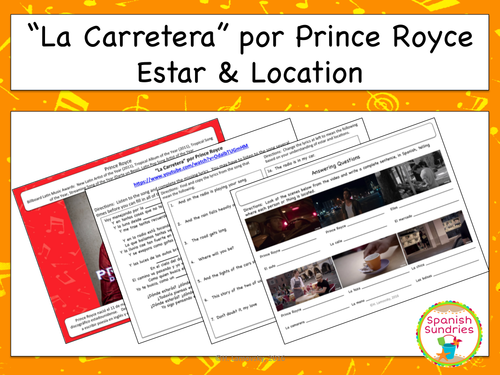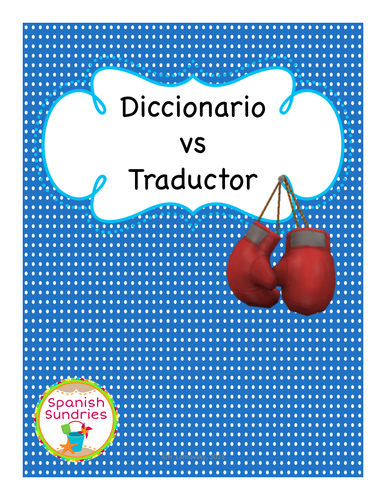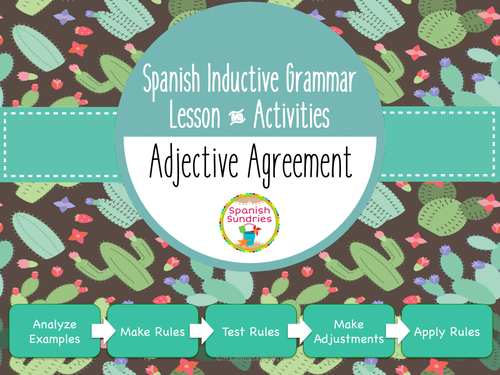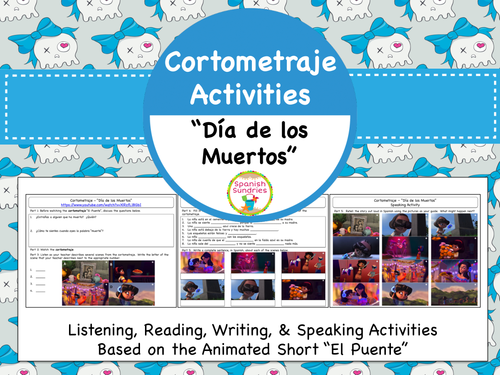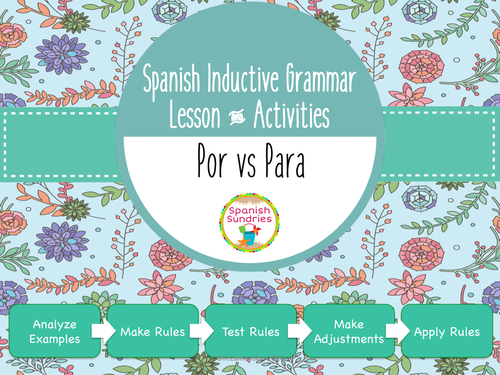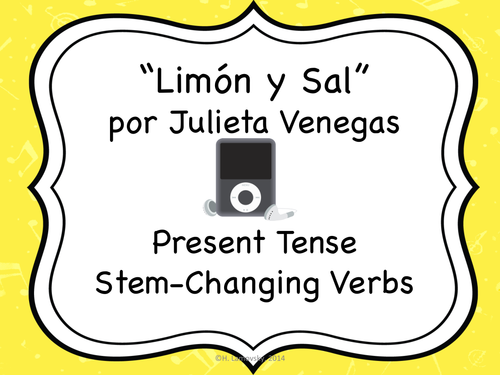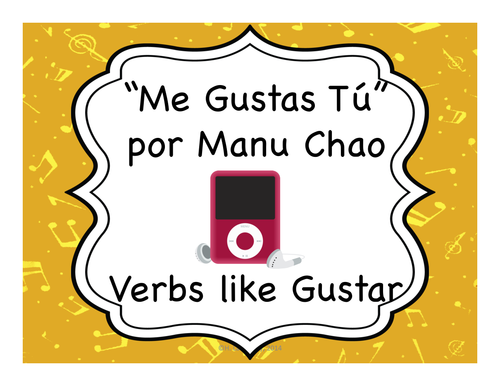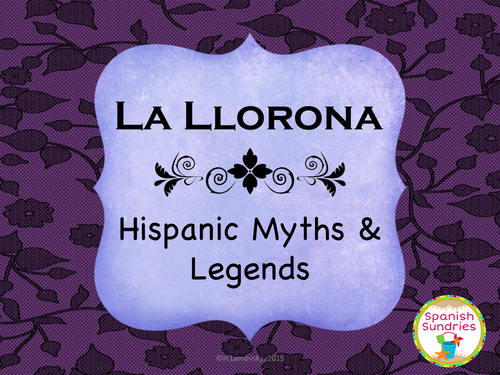
320Uploads
91k+Views
4k+Downloads
All resources

Spanish Speaking Prompts - Likes & Dislikes
These speaking prompts are designed to move students from asking/answering basic questions in Spanish to responding to increasingly complicated prompts around the theme of Likes, Dislikes, and Preferences.
There are 4 categories of prompts that ask students to move between different levels of communication including the presentation of facts, opinions, feelings, and towards complete openness in social situations.
Category A – Yes or No Questions, Either/Or Questions
Category B – Additional Information Questions
Category C – Expressing Opinions and Feelings
Category D – Situational Speaking Prompts & Extended Response
You may approach these prompts by moving students through them from Categories A-D in a sequential manner, or you may use them as an opportunity for easy differentiation between the various proficiency levels of Novice to Intermediate learners that may be present in your classroom.
Although these prompts have been designed as speaking prompts, they can also be used as writing prompts for individual practice, homework, or assessment.
Ideas for Usage:
-Pair students for one on one practice.
-Form small groups and have students interview a student.
-Invite a guest speaker or native speaking student to your classroom and have students select questions to ask them during a Q&A session
-Have students write additional prompts or variations of existing prompts on the blank cards provided
-Pull 1 prompt from each category for a challenging oral proficiency assessment
-Have students develop role plays based on the situational prompts
This Product Includes
-Guide for Educators
-15 Category A Prompts
-15 Category B Prompts
-9 Category C Prompts
-6 Category D Prompts
-Blank Cards to allow for creation of additional questions if desired

"Vivir la Vida" & The Immediate Future Tense (IR + A + Infinitive)
These activities go along with the song "Vivir la Vida" by Marc Anthony which is readily available on YouTube and iTunes. In these activities, students listen to the song and complete the missing lyrics. They are instructed on the formation of the immediate future tense and asked to locate it as well as some infinitive verbs in the lyrics of the song. Then, they are asked to locate certain lines of the song, copy them, and manipulate them. The manipulation of the lyrics requires them to use the Immediate Future Tense. There is a reading activity to help them internalize the new vocabulary learned with the song and 3 different exit tickets. The lesson also includes a short artist bio. Students will practice listening, reading, and writing in this lesson.
This Product Includes:
1. Artist Biography (in Spanish)
2. Clozeline Activity
3. Immediate Future Tense Tutorial & 2 Practice Activities
4. Lyric Identification Activity
5. Lyric Manipulation Activity
6. Vocabulary / Reading Activity
7. 3 Different Exit Tickets
8. Answer Keys

Spanish Inductive Grammar Lesson: Verbs like Gustar
This inductive grammar lesson leads students to discover the rules behind using verbs like gustar to express likes and dislikes in Spanish.
Students will follow a 4 step inductive process to make learning grammar more meaningful.
Step 1: Students will see examples of correct usage and create rules based on what they observe.
Step 2: Students will test those rules against additional examples of correct language usage.
Step 3: Students will make adjustments and additions to their rules based on more observations.
Step 4: Students will apply the rules while producing their own language.
These scaffolded activities promote higher order thinking skills and represent the method of grammar instruction that is recommended by national organizations like ACTFL.

"La Carretera" and Estar & Location
These activities are meant to help students learn to express where someone or something is located using the Spanish verb ESTAR.
These activities go along with the song "La Carretera" by Prince Royce. This song is readily available on YouTube and iTunes and a link to the song is referenced. These activities may be completed without the music video, so please make sure that the video is appropriate for your students before playing it.
Students will begin by reading a brief biography, in Spanish, of the artist.
Students will then listen to the song "La Carretera" and attempt to fill in some common Spanish vocabulary words that are missing from the lyrics of the song.
Students will then see a brief tutorial which highlights the present tense forms of the verb estar as well as some key vocabulary for expressing location (en, cerca de, lejos de, etc.)
Next students will be asked to find several lines of the song based on their English meanings. They will then manipulate those lyrics so that they include forms of the verb estar and the location vocabulary that is highlighted in the lesson. This will help them to apply this new vocabulary.
Finally, there is an activity in which students look at some images from the video and use what they have learned to write simple sentences expressing where people and things are located in each picture.
Included in this download:
-Artist Biography
-Link to the song/video on YouTube
-Cloze Activity (Listening)
-Estar & Location Tutorial (Structure)
-Lyric Identification Activity (Reading)
-Lyric Manipulation Activity (Writing)
-¿Dónde está? Activity (Writing or Oral)
-Answer Keys for all objective activities

Spanish Dictionary Skills: Dictionary vs Translator
This activity will help beginning or advanced students understand the limitations of language translators and encourage them to build fluency by using these and other tools for the right reasons.
The temptation of an online translator is irresistible to many new language students who lack the patience or drive that it takes to learn another language. Not only will this lesson help your students to see why you WILL KNOW if they use a translator, but it will help you to set ground rules as to the use of these and other tools both inside and outside of the classroom.
Students will begin this activity by learning about several online tools that may help students studying a foreign language and the appropriate use of each. Then they will compare/contrast two of those tools - an online Spanish/English dictionary and Google Translate - by first looking up underlined words in 30 sentences in the dictionary and then comparing that to what the translator says. By the end of the lesson, students will clearly see situations in which the translator was not able to make correct decisions on word choice and the increased control that using a dictionary offers.
This Product Includes:
-Foreign Language Student Toolbox Handout
-Dictionary vs Translator Activity
-Questions for Discussion & Reflection

Spanish-Speaking Country Project
This is a great report framework that your students can use to create a visually interesting country report while using the target language. It can be completed digitally or the good old-fashioned way!
This is my go to assignment when I have a student who is missing school for a family vacation. It allows them to be accountable for learning without the hassle of trying to modify assignments that we will be doing in class while they are gone.
Students will explore the cities, foods, cultures, and products of the chosen country while also incorporating practical information like flight details and distances.
This report comes in two file formats - an editable Power Point file, and a Google Slide format. If your students are learning to use Google Drive or Google Classroom, this project can instantly be shared with them using the link provided.
This project has 5 slides, the details of which are below;
Slide 1 - Title Slide (students provide name, class period, etc)
Slide 2 - Flight information, Postage Stamp design, Map
Slide 3 - Postcard Design and Writing Activities
Slide 4 - Suitcase Decoration Activity, Packing list, Souvenir Info
Slide 5 - Travel Diary including country facts, cities, typical dishes, and tourist attractions
When the project is finished, it is easy for students to present it to the class with Power Point or Google Slides. It also makes great visuals for a bulletin board or other display of student work.

Spanish Inductive Grammar Lesson: Adjective Agreement
This inductive grammar lesson leads students to discover the rules behind adjective agreement in Spanish.
Students will follow a 4 step inductive process to make learning grammar more meaningful.
Step 1: Students will see examples of correct usage and create rules based on what they observe.
Step 2: Students will test those rules against additional examples of correct language usage.
Step 3: Students will make adjustments and additions to their rules based on more observations.
Step 4: Students will apply the rules while producing their own language.
These scaffolded activities promote higher order thinking skills and represent the method of grammar instruction that is recommended by national organizations like ACTFL.

"Creo en Mi" & The Present Perfect Tense
These activities are meant to help students learn how to use the present perfect tense in Spanish.
These activities go along with the song "Creo en mi" by Natalia Jiménez, former vocalist of the well-known group "5ta Estación". This song is readily available on YouTube and iTunes and a link to the song is referenced.
After reviewing a biography of the artist, students are asked to listen to the song several times and fill in the lyrics that have been removed. Then, students are given an overview of the concept of the Present Perfect tense and asked to locate and observe it's use in the lyrics of the song. Students then are asked to find and copy certain lyrics frin within the song. Students then apply their new understanding of the present perfect tense to manipulate those lyrics and create new ones.
Included in this download:
-Artist Biography
-Link to the song on YouTube
-Clozeline Activity
-Present Perfect Tense Tutorial
-Inductive Grammar Activity
-Lyric Identification Activity
-Lyric Manipulation Activity
-Answer Keys for all objective activities

Cortometraje Activities: Día de los Muertos
These listening, reading, writing, and speaking activities accompany the cortometraje (short) "Día de los Muertos" (link included).
Students are introduced to 8 key vocabulary words that will help them to talk about the story in Spanish.
Prior to watching the animated short, they will consider a couple of questions which can then be discussed with a partner, as a whole class, or reflected on with a written response.
After watching the cortometraje, students will engage in listening activities where they must match scenes of the short with description in Spanish, reading activities where they must apply new vocabulary, writing activities where they must describe scenes, and speaking activities where they must retell the events of the story.
These are great anytime activities with a lot of comprehensible input that seek to develop all modes of communication.
This resource includes:
-Link to the Cortometraje
-Key Vocabulary
-Discussion Activity
-Listening Activity
-Listening Script for Teacher
-Reading Activity
-Writing Activity
-Speaking Activity
-Answer Keys for all Objective Activities

Spanish Inductive Grammar Lesson - Por vs Para
This inductive grammar lesson leads students to discover the rules behind using the words POR and PARA in a variety of situations in Spanish.
Students will follow a 4 step inductive process to make learning grammar more meaningful.
Step 1: Students will see examples of correct usage and create rules based on what they observe.
Step 2: Students will test those rules against additional examples of correct language usage.
Step 3: Students will make adjustments and additions to their rules based on more observations. They will summarize what they have discovered by creating their own graphic organizer using the included template.
Step 4: Students will apply the rules while producing their own language.
These scaffolded activities promote higher order thinking skills and represent the method of grammar instruction that is recommended by national organizations like ACTFL.

Spanish Animal Mini-Unit
These lessons were designed to teach students the 26 most frequently used (according to the Frequency Dictionary of Spanish by Mark Davies) animal-related words in Spanish.
This Product Includes:
-Vocabulary list with 26 animal-related words and pictorial definitions
-3 Vocabulary Sorting Activities
-1 Animal Fact Chart Activity
-1 Story Title Generator Activity
-1 Graphic Organizer
Ready to Print, Copy & Go! Great for last minute Sub plan!

School Signs in Spanish
Putting up Spanish language signs around your school is a great way to help not only the current students in your program, but also to promote your language to other students. Many of you may teach in schools with some students that ONLY speak Spanish and this is a great way to support their acquisition of English too!
This set of forty-five easy to read signs will allow you to label all of the most important places in and outside of your school building. There are a wide variety of signs to fit the needs of both primary and secondary teachers.
Each sign promotes the language with a "Learn Spanish" header so that students are aware that they are looking at words in Spanish. Also included on each sign is the Spanish word for a location in the school and the English Equivalent. Many of the signs include multiple versions in case you have a preference for certain words or terms when there are several.
If you don't want to place the signs yourself, having your level 2 or 3 students review the places in the school by placing the signs themselves is a great beginning of the school year activity.

Spanish Speaking Prompts - Jobs & Professions
These speaking prompts are designed to move students from asking/answering basic questions in Spanish to responding to increasingly complicated prompts around the theme of Jobs & Professions.
There are 4 categories of prompts that ask students to move between different levels of communication including the presentation of facts, opinions, feelings, and towards complete openness in social situations.
Category A – Yes or No Questions, Either/Or Questions
Category B – Additional Information Questions
Category C – Expressing Opinions and Feelings
Category D – Situational Speaking Prompts & Extended Response
You may approach these prompts by moving students through them from Categories A-D in a sequential manner, or you may use them as an opportunity for easy differentiation between the various proficiency levels of Novice to Intermediate learners that may be present in your classroom.
Although these prompts have been designed as speaking prompts, they can also be used as writing prompts for individual practice, homework, or assessment.
Ideas for Usage:
-Pair students for one on one practice.
-Form small groups and have students interview a student.
-Invite a guest speaker or native speaking student to your classroom and have students select questions to ask them during a Q&A session
-Have students write additional prompts or variations of existing prompts on the blank cards provided
-Pull 1 prompt from each category for a challenging oral proficiency assessment
-Have students develop role plays based on the situational prompts
This Product Includes
-Guide for Educators
-15 Category A Prompts
-15 Category B Prompts
-9 Category C Prompts
-6 Category D Prompts
-Blank Cards to allow for creation of additional questions if desired

"Mi Tesoro" & Irregular Preterite Tense Verbs
This activity goes along with the song "Mi Tesoro" by Jesse & Joy which is readily available on YouTube and iTunes. They will listen to the song and/or watch the video multiple times. Once they are familiar with the song they will engage in several different activities where they are asked to apply their knowledge of vocabulary and grammar.
This Lesson Includes:
-1 Artist Bio
-1 Clozeline Activity
-1 Lyric Scavenger Hunt
-1 Preterite Tense Tutorial
-1 Lyric Identification Activity
-1 Lyric Manipulation Activity

Spanish Interactive Notebook Fold-Its (Beginning Set)
This set of 10 foldables is a great way to get your students interacting with vocabulary and grammar concepts in new ways. While great as a stand alone teaching tool, foldables are also perfect for interactive notebooks. These foldables have endless uses and can be customized to fit your needs in a variety of ways.
This product includes:
1. Instructions on how to assemble foldables
2. Teaching Ideas for each foldable
3. Verb Chart Foldable (Front & Back)
4. House Foldable (Front & Back)
5. Dressing Room / Clothing Foldable (Front & Back)
6. Four Seasons Weather or Clothing Foldable (Front & Back)
7. Food / Menu Foldable (Front & Back, 2 Variations)
8. Emotions Foldable (Front & Back, 3 Variations)
9. Telling Time Foldable (Front & Back, 2 Variations)
10. Places Around Town Pop-Up Foldable
11. Family Tree Pop-Up Foldable (2 Variations)
12. Vocabulary Sorting Foldable (Front & Back, 2 Variations)

"Limón y Sal" & Present Tense Stem-Changing Verbs
This activity goes along with the song "Limón y Sal" by Julieta Venegas, which is readily available on YouTube and iTunes. In this activity, students listen to the song and complete the missing lyrics. Then, they are asked to locate certain lines of the song, copy them, and manipulate them. The manipulation of the lyrics requires them to use stem-changing verbs in the present tense. Students will practice listening, reading, and writing in this lesson.
Included in this download;
1. Artist Biography (in Spanish)
2. Reading Comprehension Activity
2. Copy of song lyrics with key words removed (Clozeline activity)
3. Lyric Manipulation Activity
4. Reflection Activity
5. Answer Keys

Los Tres Cerditos Storytelling Mini Unit
This two week long storytelling unit focuses on the story of Los Tres Cerditos (The Three Little Pigs). It can be used with students of all ages to build their skills in the 5 modes of communication and acquire new vocabulary.
Included in this mini-unit are not only the story of Los Tres Cerditos, but also reading, listening, speaking, writing, and assessment activities.
There is also a Guide for Educators which explains each activity and the recommended sequence of instruction.
Included in this Resource:
-Guide for Educators
-Los Tres Cerditos Visual Story Presentation
-Los Tres Cerditos Illustrated Text
-Cloze Listening Activity
-Vocabulary Acquisition Activity
-Story Sequencing Activity
-Reading Comprehension Questions
-Loco Lib Alternate Ending Activity
-Interpersonal Speaking Partner Activity - (2 Versions)
-Illustration Only Pages for Story Re-Telling

"Me Gustas Tú" & Verbs like Gustar
These activities go along with the song "Me Gustas Tú" by Manu Chao which is readily available on YouTube and iTunes. In the first activity, students listen to the song and complete the missing lyrics. In the second activity, they are asked to locate certain lines of the song and copy them. In the third activity they will manipulate those lyrics. The manipulation of the lyrics requires them to use a variety of "backwards" verbs like gustar. The final activity is an extension activity where students write a verse for a make-believe song called "Me Disgustas Tú" using the same lyrical pattern and rhyme scheme of this song. The lesson also includes several higher-order thinking questions for discussion. Students will practice listening, reading, and writing in this lesson.
This Product Includes:
1. Questions for Discussion
2. Clozeline Activity
4. Lyric Identification Activity
5. Lyric Manipulation Activity
6. Extension Activity
7. Answer keys for all objective exercises

Hispanic Myths & Legends: La Llorona
This lesson introduces beginning language learners to the legend of La Llorona in a way that promotes using legends to learn about culture in a deep and meaningful way.
This lesson asks students to consider some complex ideas and make connections between the products, practices, and beliefs of Hispanics around the world. These activities promote higher-level thinking that would be beyond the grasp of most students in the target language, so the lessons are done in English to make sure they are attainable.
These lessons make perfect sub plans as they require no prep and little to no Spanish language production.
Students begin by reading the legend of La Llorona and illustrating the legend to demonstrate comprehension and understanding.
Students are then debriefed on the class system that existed in colonial Mexico and serves as a tie in to the legend itself. Students are then asked to reflect on the social hierarchy within their school building to gain a greater understanding of the feelings and motivations of the lover of La Llorona in the legend.
Finally, students will read a second and slightly different version of the legend from Texas. They will be asked to compare and contrast the two versions and reflect on the cultural differences between the two groups.
This Product Includes:
-La Llorona Legend (version 1)
-Illustration Activity
-Social Class in Colonial Mexico Activity
-Social Hierarchy in Schools Activity
-La Llorona Legend (version 2)
-Venn Diagram Activity

Spanish Christmas Carol Activities (Villancicos Navideños)
Do you want to expose your students to Spanish language Christmas carols (villancicos) in a way that enforces learned grammar and vocabulary concepts?
These activities accompany 3 popular Spanish language villancicos readily available on YouTube or iTunes. Students will listen to each of the villancicos and attempt to complete the missing lyrics, then they will complete a variety of activities with each song that reinforce basic Spanish vocabulary, vocabulary related to the Chirstmas season, and grammar concepts like gerunds, the verb IR, diminutives, and many more.
This product focuses on the following Villancicos:
-"Rodolfo el Reno" cantado por Thalia
-"Mi Burrito Sabanero" cantado por Juanes
-"Los Peces en el Río" cantado por los Gipsy Kings
This product includes:
-3 Cloze Activities
-Vocabulary Matching Activity
-Description Activity
-Grammar Scavenger Hunt
-Grammar Review Activity
-Lyric Illustration Activity

